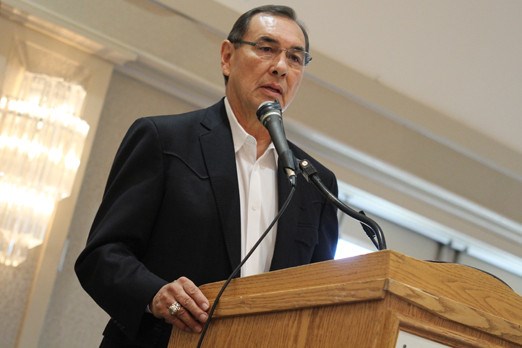September is still a sad time in many First Nations communities.
Though it’s been decades since the last residential school students were ripped from their homes and forced to attend schools hundreds of miles away from the loving arms of their parents and families, the scars still run deep.
On Thursday dozens of survivors and their sons, daughters and grandchildren came together in Thunder Bay to continue the healing process, taking part in Walking Together, Sharing our Journey, part of a five-day celebration of the students forced to attend residential schools between 1857 and the 1980s, when the last of the hated institutions shut its doors for good.
The impact of the schools is still being felt today, said Truth and Reconciliation Commission of Canada commissioner Wilton Littlechild, himself a residential school survivor.
The damage has been done, but it can be fixed, he said.
“We ask ourselves, and people ask us, how come you are the way you are? How come you Indians are the way you are? We ask, what happens to a child when you take them away from their family at a very young age? We’ve all been impacted by this experience, but particularly the students. They know firsthand what happened to you, what happened to me when we were taken away from our parents.”
In 1857, 10 years before Confederation, the Gradual Civilization Act was passed to assimilate Aboriginals into mainstream society, denying them knowledge of their people’s past.
By 1920 it was mandatory for all children between seven and 15 to attend the schools, with many forcibly removed from homes by priests, police and government officials. Eleven years later there were 80 residential schools operating in Canada.
By the 1980s, with the schools finally on their way out, former students began disclosing years of sexual and physical abuse, though it took until 2008 for Prime Minister Stephen Harper to issue an apology on behalf of all Canadians for the way First Nation families were treated by the country for more than a century.
Littlechild said it took him 40 or 50 years to reach back into his past and finally understand it wasn’t his fault and to slowly move on with his life.
“I was ashamed of who I was,” he said, on a lengthy cross-country mission to help collect stories for the TRC, the goal to create a strategy to deal with the hurt and help Canadians of all ethnic backgrounds move forward together.
“I was ashamed to be an Indian. But today, I’m proud to be who I am.”
Nishnawbe Aski Nation Deputy Grand Chief Les Loutit spent two years at a residential school in Sudbury and said he and his fellow students have faced an ongoing struggle trying to understand the pain they were forced to suffer through.
It took Loutit until 2000 to come to grips with his past, more than 40 years after his childhood experience began.
Like Littlefield, he had an epiphany, a moment when he realized he didn’t have to be ashamed of that past.
“We need to take ownership of what’s happened to us. There’s a lot of blame. But we also have to go beyond that and establish a positive attitude for the future going forward,” Loutit said, noting there are good memories from his residential school days.
Shelagh Rogers, the well-known CBC Radio host, did not attend a residential school, but called what happened to First Nation children and their families a huge stain on Canada, a stain the country needs to blot out together.
An honorary TRC witness, Rogers said it’s time for Canadians to walk the walk and talk the talk.
“It’s time to open our hearts and open our ears and heal ourselves,” she said, a day before she’ll deliver Friday’s keynote address.
“There are a lot of reasons I think that we don’t know what happened. We have a lot of catching up to do.”
Coun. Rebecca Johnson, representing the City of Thunder Bay at the conference, said when she was young she though students at the St. Joseph’s Residential School were orphans with no parents to love them.
It was only later she discovered the truth.
“That was a learning experience for me as an adult,” she said, noting the city has set aside $25,000 in its budget to build a memorial to St. Joseph Residential School students, which will hopefully reside on the Franklin Street property where the school once was.
Littlechild, who said victims must learn to say, “I’m sorry,” “Forgive me” and “I love you,” said it’s up to everyone to complete the healing process.
“It’s going to take the both of us to find the reconciliation for Canada.”
